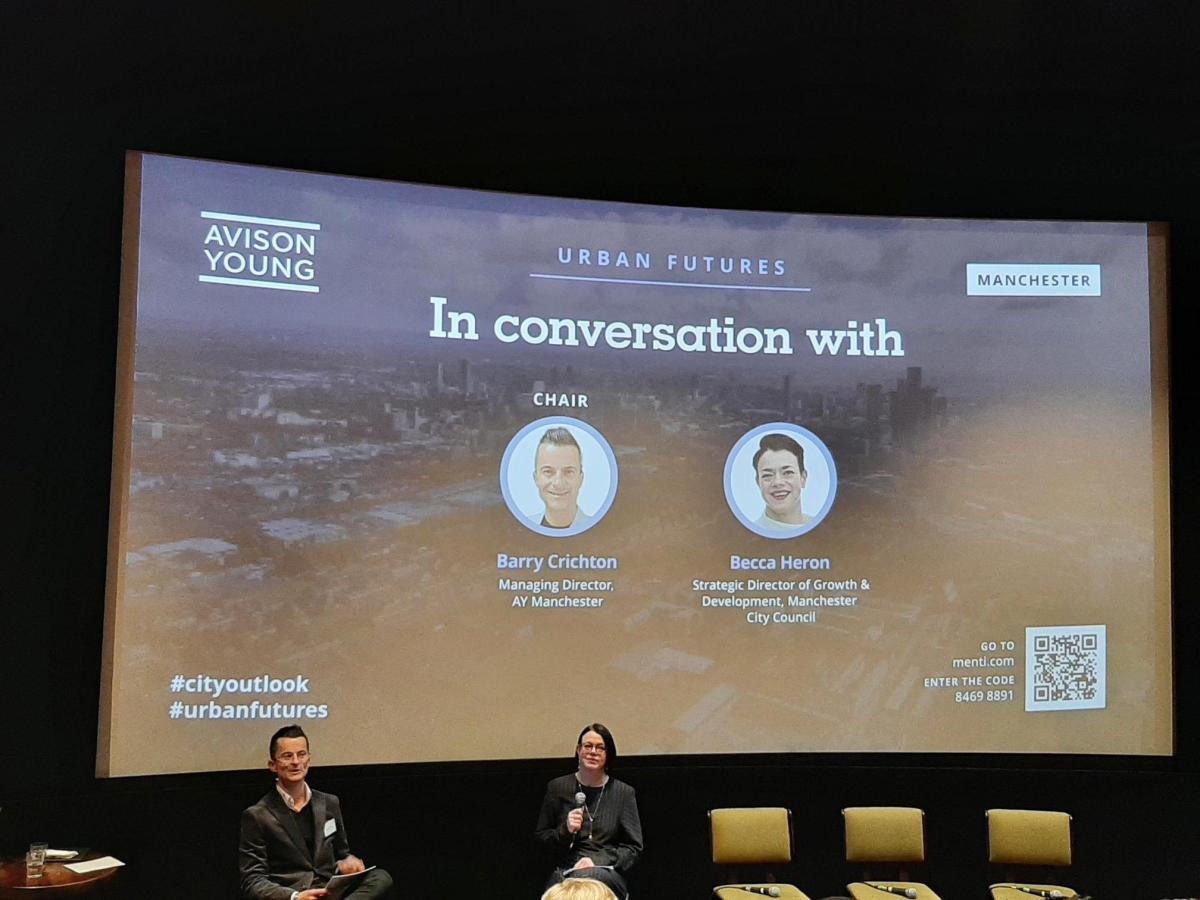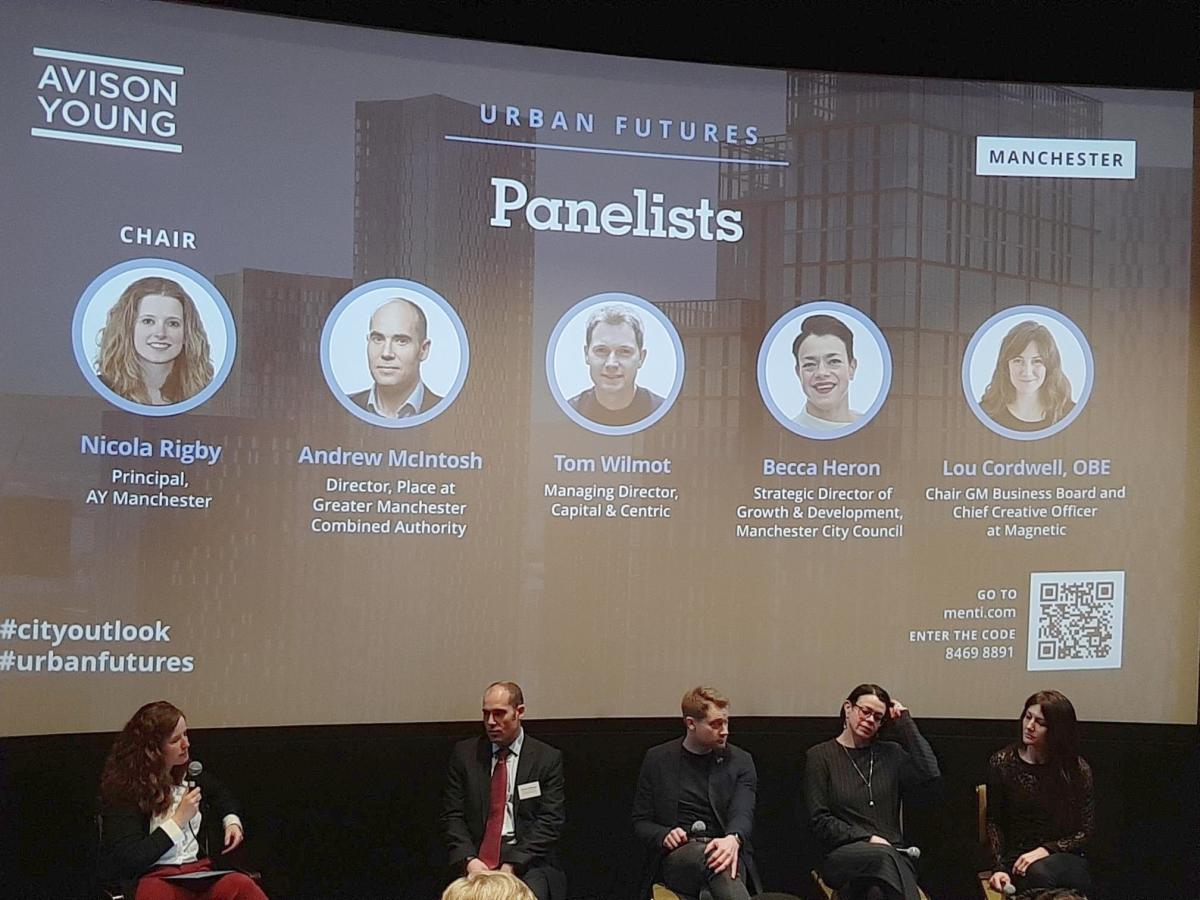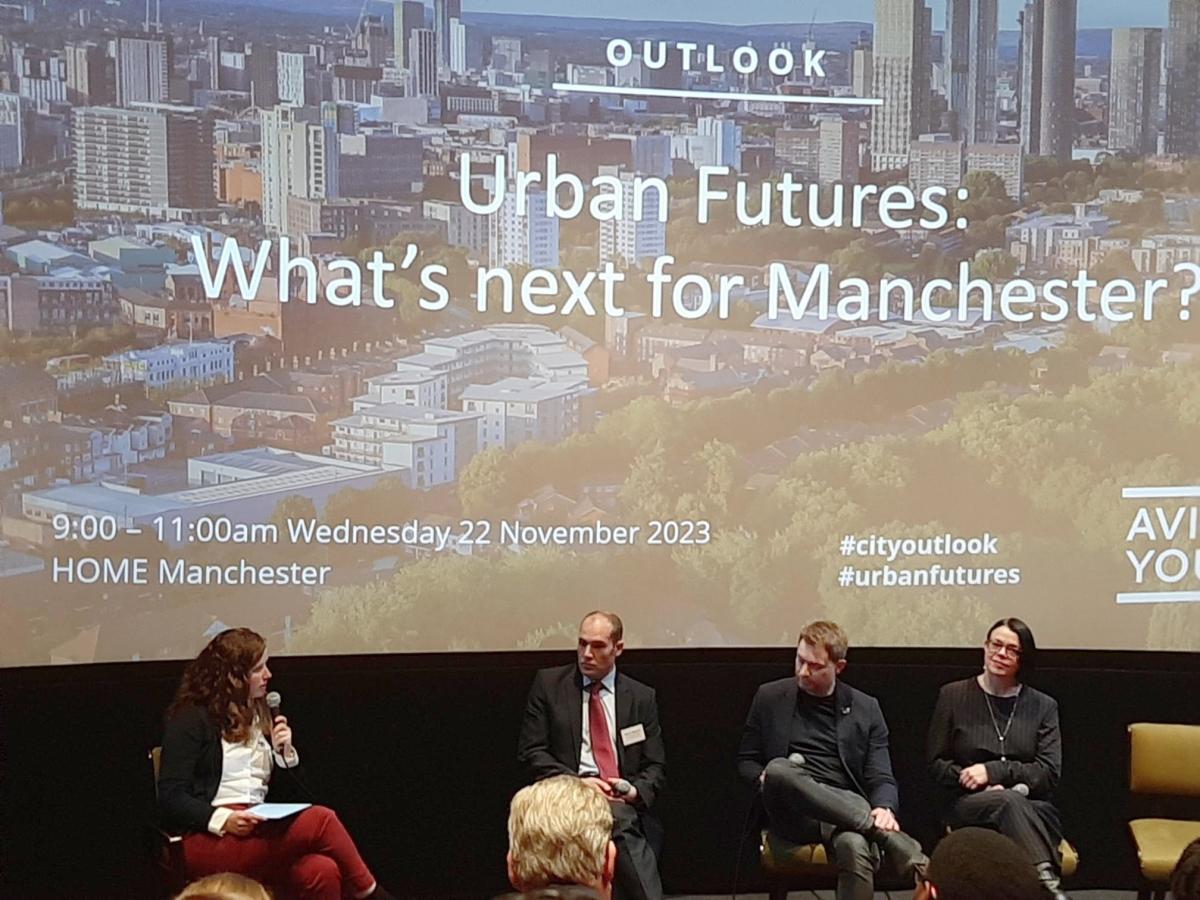On Wednesday 22nd November 2023, Manchester Invest Partnership Associate Avison Young hosted an event ‘Urban Futures: What's next for Manchester’ to discuss the growth within the city and how to best leverage infrastructure and investment opportunities to fuel further, inclusive growth.
Barry Crichton, Managing Director of Avison Young Manchester opened the session by discussing Avison Young’s perception of Manchester’s growth story and why it has proven so successful. He discussed the role of partnerships and collaboration, infrastructure, skills and how Manchester compares against other leading cities across the UK.
Barry Crichton, Managing Director of Avison Young “Manchester is continually held as an exemplar of local authority, it continues to punch above its weight against the rest of the UK”.
Then, Barry Crichton hosted an ‘in conversation with’ session with Becca Heron Strategic Director of Growth & Development at Manchester City Council as she celebrates 2-years in post. Throughout the conversation, they discussed how Manchester has changed, the successes and the challenges Becca faced throughout her career as well as some of the projects she’s currently working on and opportunities for Manchester.

She mentioned the ongoing redevelopment of Strangeways which will be one of the city’s most complex regeneration projects to date and the plans for the redevelopment of Holt Town and Wythenshawe, with emphasis on the importance of understanding the role of each of the neighbourhoods and what it means to the community.
Becca Heron said, “I think Manchester has proven more resilient than a lot of places. I'm not saying it’s easy and getting schemes to stack up is really challenging but we have seen demand maintained and growing in Manchester, and a lot of developers are seeking Manchester as an alternative to London.
“Manchester’s resilience is a testament to its partnerships. It comes back to being clear about what your ambition is for an area. What has really stood Manchester in good stead is that we’ve got a really good track record of looking at what drives an area, what the challenges are and what we want to achieve to make a strategic vision. Then, you can find partners that share your vision.”
When discussing the future ambitions of Manchester and the wider city-region, alongside plans for a refreshed economic strategy, Becca Heron spoke of the need for improved skills provisions, retaining talent, investing in infrastructure, improving connectivity and working towards a more sustainable, net zero future. However, she made it clear that the most important factor within Manchester is driving that growth to benefit the city’s growing population.
Becca Heron said, “Manchester is still very much about growth, we know we need to see more of it. Your approach will always have to evolve, but Manchester is still about growth, our new economic strategy will show that. Not all of our residents feel connected to the growth in the city centre so it’s about how can we do more of the upskilling and plugging businesses into the agenda?”

Next, it was time for a panel session where Becca Heron was joined by Lou Cordwell, Chief Creative Officer of Magnetic North and Chair of Greater Manchester Business Board (LEP), Andrew McIntosh, Director of Place at Greater Manchester Combined Authority and Tom Wilmot, Managing Director of Capital&Centric. The panel was chaired by Nicola Rigby Principal at Avison Young.
In the panel session Lou Cordwell discussed the city’s attractiveness to international businesses and investors, the potential of the city in terms of talent, ambition and understanding of a total ecosystem as well as the value in strategic partnerships, like the one Greater Manchester has just established with Cambridge to create the first cross-UK Innovation ecosystem.
On the importance of tech to Greater Manchester’s future, Lou Cordwell said “Digital tech is phenomenally important to the Greater Manchester economy. Tech vertical as a sector that now employs thousands of people is now seen as a really central part of our economy. 15 years ago our leaders decided that there was not a sector that wouldn’t be touched by tech, whether that’s health innovation, property
"The success we’re seeing as the fastest-growing tech city in Europe is a testament to our foresight and long-term planning. It shows risk-taking and long-term bets does pay off.
"If you think of globally significant places, they’re significant because of their output. What’s useful over the past 2-3 years is that the backdrop in the UK is very focused on tech. There are not many places, I’d argue it is only Manchester, that can deliver on that UK vision.”
Andrew McIntosh Director of Place at Greater Manchester Combined Authority discussed Manchester’s devolution deal, what it means for growth and the challenges that come with it particularly with funding.
Andrew McIntosh said “I appreciate there’s a balance and we have to get that balance right. The devolved control means that we can be flexible in how we work with partners. By thinking about a longer-term approach to regeneration and place-based development will start to close the gap in these funding challenges and bring forward development for growth. It’s about long-term plans that involve the local community.”
Tom Wilmot Managing Director of Capital&Centric discussed why developers like him are choosing Manchester to partner with and how working with the local authority can help overcome challenges like rising costs, rising insurance policies and more.
Tom Wilmot said, “Transformational regeneration really excites us, not just Transforming for this generation but for generations to come which is why we are involved in Farnworth Green in Bolton, Wier Mill in Stockport and Piccadilly East in Manchester. We like to locate ourselves in an area with a strong local authority and a clear vision so we can work closely with public sector partners.
“There are clearly viability challenges in the sector at the moment, we are in an environment where we all need to pull together and be a bit more creative to unlock things. The projects of most strategic relevance should be the projects that get public sector support.”

Becca Heron then discussed the role of planning and collaboration, mentioning masterplans like the council's plans for Holt Town but also Greater Manchester’s Growth Locations and Places for Everyone schemes, she emphasised that places should not be competing but instead focusing on strengths to work together to create a stronger ecosystem.
Becca Heron said “Trying to forecast changes is really difficult, we want to grow, we want to spread the benefits of that growth more widely so that people can grow throughout their lives within the city.
"Places for everyone is fundamental and is a testament to the close working and partnership across Greater Manchester. It's about looking at how those places relate to each other, it’s a long-term vision. Turning that into investable propositions will be the trick.
"It’s not helpful that areas are pitted against each other. When there are funding rounds we'll be in competition with Leeds and Liverpool but what we need to do is work with those cities and improve that connectivity to benefit us all. There are different roles for each of those places. We should be trying to work with instead of compete and create an ecosystem.”

